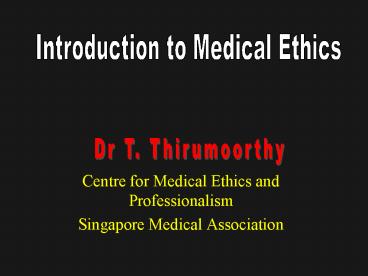Centre for Medical Ethics and Professionalism - PowerPoint PPT Presentation
1 / 17
Title:
Centre for Medical Ethics and Professionalism
Description:
practise my profession with ... of values concerning the practice of medicine. ... The practice of medicine is rooted in the convenant of trust ... – PowerPoint PPT presentation
Number of Views:336
Avg rating:3.0/5.0
Title: Centre for Medical Ethics and Professionalism
1
Introduction to Medical Ethics
Dr T. Thirumoorthy
- Centre for Medical Ethics and Professionalism
- Singapore Medical Association
2
SYSTEMS GOVERNING HUMAN SOCIAL BEHAVIOUR
3
THE MEDICAL ECOSYSTEM - Enlarging Circle of
Influence
4
SMCS PHYSICIANS PLEDGE
- I solemnly pledge to
- dedicate my life to the service of humanity
- give due respect and gratitude to my teachers
- practise my profession with conscience and
dignity - make the health of my patient my first
consideration - respect the secrets which are confided in me
- uphold the honour and noble traditions of the
medical profession - respect my colleagues as my professional
brothers and sisters - not allow the considerations of race, religion,
nationality or social
standing to
intervene between my duty and my patient - maintain due respect for human life
- use my medical knowledge in accordance with the
laws of humanity - comply with the provisions of the Ethical Code
- and constantly strive to add to my knowledge and
skill - I make these promises solemnly, freely and upon
my honour.
5
MEDICAL ETHICS - definition and scope
- System of values common to the medical
profession. - Systematic application of values concerning the
practice of medicine. - Standards of behaviour by which the physician
may evaluate his/her relationships with
patients, colleagues and society. - Scope of medical ethics includes
- development of ethical codes and guidelines
- promotion of ethical practice
- prevention of ethical breaches
- recognition of ethical dilemmas
- resolution of ethical conflicts
6
Components of Medical Ethics
- The Physician -- Patient Relationship
- The Physician -- Physician Relationship
- The relationship of the Physician to the System
of Healthcare - The Relationship of the Physician to Society
7
THE PRINCIPLES IN MEDICAL ETHICS
- The Principle of Non-Maleficence
- The Principle of Beneficence
- The Principle of Autonomy
- The Principle of Veracity
- The Principle of Confidentiality(or Fidelity)
- The Principle of Social Responsibility and Justice
8
The Principle of Non-Maleficence
- first do no harm
- sanctity of life
- calculated risk or risk benefit
9
The Principle of Beneficence
- do only that which benefits the patient
- patients welfare as the first consideration
- care consideration competence
10
The Principle of Autonomy
- right to information and self determination
- free and informed consent
- free will and accord - intentional participation
in treatment - respect and dignity maintained
11
The Principle of Veracity
- Truth telling
- Obligation to full and honest disclosure
12
The Principle of Confidentiality
- Based on loyalty and trust
- Maintain the confidentiality of all personal,
medical and treatment information - Information to be revealed with consent and for
the benefit of the patient - Except when ethically and legally required
- Disclosure should not be beyond what is required
13
The Principle of Justice and Social Responsibility
- Actions are consistent, accountable and
transparent - not to discriminate on age, sex, religion, race,
position or rank - greater good of society
- respect of the Law
- equity and distribution of burden benefits
14
Conflicts of Ethical Principles
paternalism
nonmaleficence
research
autonomy
dual obligations
family interest
veracity
justice
payer's interest
beneficence
confidentiality
15
Resolution of Ethical Dilemmas
- Principles
- Ethical codes
- Clinical judgement
- Reasoned analysis
- Ethical committees
- Ethical tests
- Declarations
- Oaths Pledges
- Commonsense
- Debate
- Ethical Consults
- The Law
16
Introduction to Medical Ethics
- CONCLUSION
- The practice of medicine is rooted in the
convenant of trust among patients, physicians
and society - The Physician is obligated to be a healer and a
professional. This role is built on expertise,
ethics and service - Just as a Vet is expected to love animals, a
Physician must have inherent love for humans and
Humanity
17
(No Transcript)































